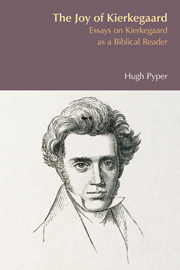Book contents
- Frontmatter
- Contents
- Preface
- Acknowledgments
- Abbreviations
- 1 The Joy of Kierkegaard
- 2 Kierkegaard's Canon: The Constitution of the Bible and of the Authorship in Concluding Unscientific Postscript
- 3 The Apostle, the Genius and the Monkey: Reflections on Kierkegaard's ‘The Mirror of the Word’
- 4 Your Wish Is My Command: The Peril and Promise of the Bible as ‘Letter from the Beloved’
- 5 The Lesson of Eternity: The Figure of the Teacher in Kierkegaard's Philosophical Fragments
- 6 Cities of the Dead: The Relation of Person and Polis in Kierkegaard's Works of Love
- 7 Adam's Angest: The Language of Myth and the Myth of Language
- 8 Beyond a Joke: Kierkegaard's Concluding Unscientific Postscript as a Comic Book
- 9 ‘Sarah Is the Hero’: Kierkegaard's Reading of Tobit in Fear and Trembling
- 10 How Edifying Is Upbuilding? Paul and Kierkegaard in Dialogue
- 11 Forgiving the Unforgivable: Kierkegaard, Derrida and the Scandal of Forgiveness
- Bibliography
- Index of Biblical References
- Index of Authors
11 - Forgiving the Unforgivable: Kierkegaard, Derrida and the Scandal of Forgiveness
- Frontmatter
- Contents
- Preface
- Acknowledgments
- Abbreviations
- 1 The Joy of Kierkegaard
- 2 Kierkegaard's Canon: The Constitution of the Bible and of the Authorship in Concluding Unscientific Postscript
- 3 The Apostle, the Genius and the Monkey: Reflections on Kierkegaard's ‘The Mirror of the Word’
- 4 Your Wish Is My Command: The Peril and Promise of the Bible as ‘Letter from the Beloved’
- 5 The Lesson of Eternity: The Figure of the Teacher in Kierkegaard's Philosophical Fragments
- 6 Cities of the Dead: The Relation of Person and Polis in Kierkegaard's Works of Love
- 7 Adam's Angest: The Language of Myth and the Myth of Language
- 8 Beyond a Joke: Kierkegaard's Concluding Unscientific Postscript as a Comic Book
- 9 ‘Sarah Is the Hero’: Kierkegaard's Reading of Tobit in Fear and Trembling
- 10 How Edifying Is Upbuilding? Paul and Kierkegaard in Dialogue
- 11 Forgiving the Unforgivable: Kierkegaard, Derrida and the Scandal of Forgiveness
- Bibliography
- Index of Biblical References
- Index of Authors
Summary
Two months to the day before Kierkegaard's death on 11 November, 1855, a terrifying article of his on ‘Divine Justice’ appeared in The Moment no. 8. In it, Kierkegaard addresses the problem of the apparent triumph of tyranny, injustice and evil in the world. How is this to be reconciled with the justice of God? Kierkegaard's argument is that divine justice appears precisely in allowing great sinners to go unpunished within time, so that their crimes can fully mature:
Yes, tremble that there are crimes that need all of time in order to come into existence, that occasionally, perhaps out of consideration for the rest of us, cannot be punished in this life. Tremble, but do not accuse God's justice; no, tremble at the thought of this (how frightful it sounds when said this way!) dreadful advantage of only being punished in eternity… But the criminal whose distinction was that he cannot be punished in this world consequently cannot be saved; by not being punished within time, he cannot be saved for eternity.
(MLW 306)This echo of a theology to be found in the psalms is highly disturbing for our modern sensibilities, conscious as we are of the hideous record of genocide and crimes against humanity of the twentieth century. It combines two possibilities of outrage. The first is the notion that God consciously permits these criminals to commit monstrous crimes against innocent victims.
- Type
- Chapter
- Information
- The Joy of KierkegaardEssays on Kierkegaard as a Biblical Reader, pp. 145 - 160Publisher: Acumen PublishingPrint publication year: 2012



